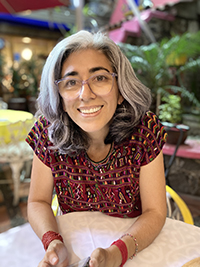Dr. Beatriz Miranda-Galarza
Special Rapporteur on discrimination against persons with leprosy (Hansen’s disease)

Beatriz Miranda-Galarza was born in Ecuador and currently lives in Mexico. She holds a PhD in Sociology and Disability Studies (University of Leeds, England), a Master's Degree in Anthropology with a specialisation in Development and Disability (KU Leuven University, Belgium), a Master's Degree in Latin American Studies (University of the Andean Parliaments Simon Bolivar, Ecuador) and a specialisation in Social Development (Technological Institute of Monterrey, México). She graduated in Sociology and Political Science from the Central University of Ecuador. She is currently the coordinator of the Critical Disability Studies Programme at 17, Institute of Critical Studies in Mexico City, where she also coordinates the area of Critical Studies in Health.
In 2010, Miranda-Galarza began her involvement in the field of leprosy/Hansen's disease by coordinating the SARSHE and BRIDGES projects, which aimed to work with people affected by leprosy/Hansen's disease who have developed a disability in Indonesia and Brazil. The main objective of these projects was to strengthen the capacity of the leprosy movement in dialogue with the disability movement. She has also been involved in training people affected by leprosy/Hansen's disease and disability in participatory action research (PAR) in Myanmar, Timor Leste, Indonesia, Brazil, Nepal, India, Ecuador and Mexico. She has been involved in research and training projects related to leprosy and disability, arts and culture, and associative movements in several countries in Latin America, Europe, and Asia.
In 2019, Miranda-Galarza co-edited with Prof. Patrick Devlieger the book "Rethinking disability: World Perspectives, Cultures and Societies". In 2018, she published the book "Nuestra historia no es mentira: Vivir con "lepra en Ecuador" with Seventeen Editorial. Based on this book, performance artists from the Autonomous University of Mexico created a theatre play called "Veracruz o los últimos leprosarios", which is also available in a digital version. She is also co-editor of "El Alto" "Arte y discapacidad en las Americas/ Art and Disability in the Americas" with Tangled Arts, Toronto and the British Council Canada. She has written articles and book chapters on leprosy, gender, family and disability, critical perspectives on intellectual disability, personal knowledge, participatory action research, art and culture, violence and torture, inclusion and natural disasters.
She has taught at the University of Leeds, the University of Amsterdam and Amsterdam University College, where she has taught contemporary social problems, sociology and medical anthropology, participatory research methods, disability and research, international public health and global health issues. Since 2013, SHE has been involved in supporting arts and culture and oral history projects related to leprosy/Hansen's disease and disability in Mexico and Latin America. She is currently preparing several seminars on leprosy/Hansen's disease and disability related to reflection on A-theology and research on genetics and Fragile X syndrome.
Her family lives in Ecuador and she has three disabled siblings due to Fragile X Syndrome. The things she enjoys most in her life are reading printed books, walking around her hometown and eating ice cream with her siblings.